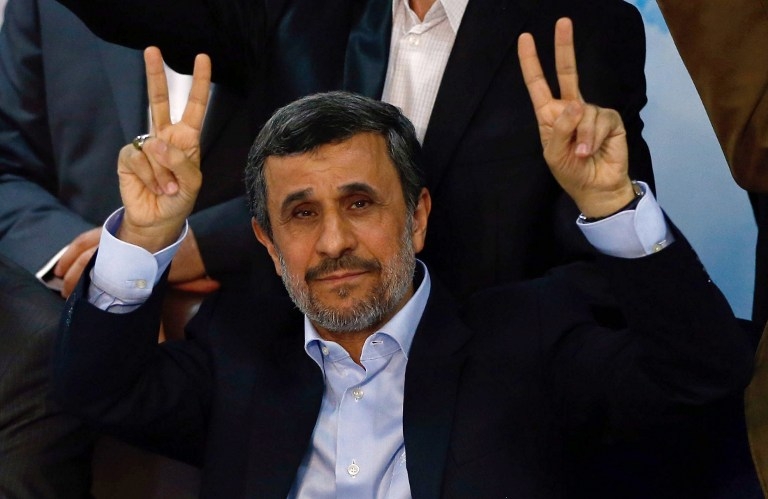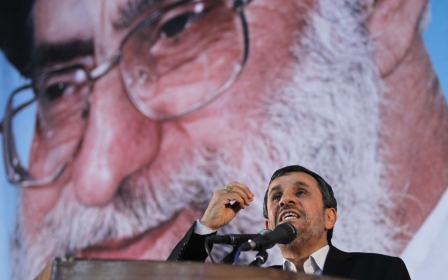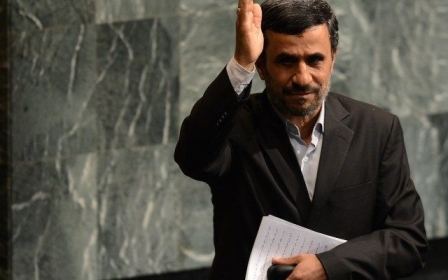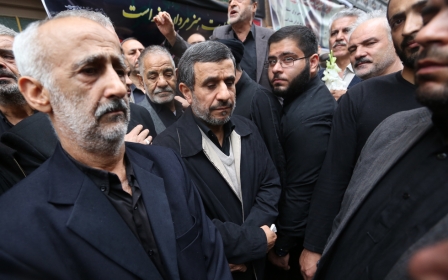Iran election: Shock as Ahmadinejad registers candidacy

Iran's former president Mahmoud Ahmadinejad made a surprise move on Wednesday by registering as a candidate for next month's presidential election.
Ahmadinejad last year ruled out a comeback after Supreme Leader Ayatollah Ali Khamenei indicated it could have a "polarising" effect on the nation.
And last Wednesday he pledged to support his former deputy Hamid Baghaie.
Though the move was seen as a challenge to Khamenei, Ahmadinejad told reporters he remained committed to his "moral promise" to Khamenei of not running for the 19 May election.
Khamenei's "advice was not a ban," he told AFP at the interior ministry where registration was taking place.
"I repeat that I am committed to my moral promise [of not running] and my presence and registration is only to support Mr Baghaie," he said.
More than 100 candidates have registered so far for the vote. The Guardian Council has stopped hundreds of candidates from participating in past elections.
Conservatives try to regroup
Long seen as standing outside the mainstream conservative grouping in Iran, Ahmadinejad's announcement is likely to rock the conservative establishment who are trying to unite around a single figure.
Conservatives announced a shortlist of five presidential candidates on Thursday as they experimented with their first-ever democratic primary in a bid to find a leader to challenge President Hassan Rouhani, who has succeeded in uniting moderates and reformists.
Among the shortlisted candidates were Parviz Fattah, head of another charitable foundation, and former lawmakers Alireza Zakani and Mehrdad Bazrpash, both fierce critics of the 2015 deal with world powers that saw sanctions eased in exchange for curbs to Iran's nuclear programme.
This marks a sea-change to the time-worn tradition of Iran’s elders deciding on candidates.
"In the past, a few elders would sit and come out with some choices, but now it has become a process like a referendum where forces at the bottom can influence the final decision," Abdolhossein Moslemi, a cleric, told AFP.
Tehran-based political expert Amir Mohebbian agreed that "the old mechanisms had failed".
Since the 1990s, he said, the choices by conservative grandees have lost every time - either to more reformist candidates, or in the case of Ahmadinejad, to a hardline populist who refused to play ball with the establishment in a way that many have lately compared to Donald Trump.
Ahmadinejad's two terms as president between 2005 and 2013 saw Iran increasingly isolated internationally, divided domestically and struggling economically, and his contested re-election in 2009 triggered the largest protests since the 1979 Islamic revolution.
Registration for the 19 May election started on Monday and will last five days, after which entrants will be screened for their political and Islamic qualifications by a vetting body, the Guardian Council.
Arrest of social media activists
Ahead of next month's election, social media activists have been held on security and obscenity charges, the judiciary said on Wednesday.
"Some of these people have been arrested on national security charges and some... for committing crimes against public decency and publishing obscene content," deputy judiciary chief Gholamhossein Mohseni Ejeie told the Mizan Online news agency.
Twelve people who run reformist and pro-government discussion forums on the popular messaging app Telegram were arrested last month.
Authorities released no information at the time of their arrests and the detainees have not appeared in open court.
Local media said the Telegram channels were shut down after the arrests. At least one was restored within a few days, but has not posted anything since 17 March.
Telegram, which has more than 20 million users in Iran, has attracted attention from authorities which want to force channels with more than 5,000 followers to register with the government.
Middle East Eye propose une couverture et une analyse indépendantes et incomparables du Moyen-Orient, de l’Afrique du Nord et d’autres régions du monde. Pour en savoir plus sur la reprise de ce contenu et les frais qui s’appliquent, veuillez remplir ce formulaire [en anglais]. Pour en savoir plus sur MEE, cliquez ici [en anglais].




